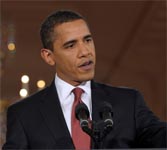After progress in Geneva, Obama keeps up pressure on Iran
 Vienna/Geneva - If Thursday's agreement on further talks between Iran, the five permanent UN Security Council members and Germany gave reason for some optimism, US President Barack Obama made clear he would keep up the pressure on the Islamic state.
Vienna/Geneva - If Thursday's agreement on further talks between Iran, the five permanent UN Security Council members and Germany gave reason for some optimism, US President Barack Obama made clear he would keep up the pressure on the Islamic state.
Experts say it was exactly the mounting pressure from Western powers in past weeks - a combination of setting an ultimatum, threatening sanctions and carefully timed intelligence leaks - that pushed Iran forward in the talks in Geneva on Thursday.
"Iran knows Obama is a very serious man," said Andreas Persbo, who heads the arms control thinktank VERTIC in London.
He referred to the readiness of the US and its allies to push for further sanctions early next year unless Iran complies with International Atomic Energy Agency (IAEA) inspections and helps build confidence in its disputed nuclear programme.
On the surface, the meeting of Iranian diplomats with counterparts from Britain, China, France, Russia, the United States and Germany in Geneva on Thursday yielded several positive outcomes.
Besides the agreement on a new round of talks before the end of October, Iran said it would let IAEA experts visit its newly revealed uranium enrichment site which is under construction, and which should have been declared years ago under IAEA rules.
Iran's realization that Western intelligence agencies had long known about the site near Qom and that the country's secrecy has been compromised helped produce that outcome, said Sharon Squassoni, an expert at the Carnegie Endowment for International Peace in Washington.
Obama said he wanted to see such inspections within two weeks.
"This should not be the end of US demands," Squassoni said.
Despite the planned visit, Iran's top negotiator Saeid Jalili made it clear his country would not comply with IAEA regulations to inform about nuclear sites before starting to build them.
"If Iran does not take steps in the near future to live up to its obligations then the United States will not continue to negotiate indefinitely and we are prepared to move toward increased pressure," Obama said in Washington.
In addition, Iran agreed to consider sending most of its enriched uranium stockpile to Russia and France, where it is to be enriched further and sent back to Iran to be used in a small medical-purpose reactor.
Western diplomats say that this would make it more difficult for Iran to turn the uranium into nuclear weapons, rather than for its official purpose as reactor fuel.
By saying this was "a step" to build confidence in Iran's assertion that its nuclear activities are peaceful, Obama made clear more should follow.
Yesterday's talks showed that "Iran does not stop enrichment or is even considering to stop enrichment," despite demands by the Security Council, said David Albright, who heads the nuclear non-proliferation thinktank ISIS in Washington.
Iran could easily replace the exported stockpile by enriching more material in its Natanz plant, he warned.
Symbolically, the most significant event in Geneva was the highest-level direct encounter between the United States and Iran in 30 years, when the US State Department's top diplomat Richard Burns held bilateral talks with Jalili.
Despite this atmospheric breakthrough, analysts said the cloud of possible sanctions still hangs over Iran's head.
The threat of additional punitive measures became more credible last week when Russia signalled it was ready to consider such moves.
Among the five permanent members of the Security Council, only China has little appetite for more sanctions, owing to its strong energy ties with Iran.
The US and its allies have been mulling measures to target Iran's oil and gas industries as well as fuel imports.
"If you really want to hurt Iran, that's what you have to do," Squassoni said. (dpa)